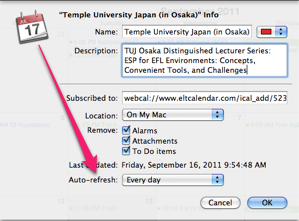Kyoto JALT:
Presentations: Practice makes perfect! and Annual Business Meeting
Date: Sunday, October 24th, 2010 Time: 1:30 PM - 4:00 PM
Speaker: Daniel Mills, Jhana Bach, Kelly Butler and Stephen Dalton
Description:
1:30-2:00 Registration and Opening
2:00-2:45
Examining the "carry-over effect" by Daniel Mills (Room 1)
From Boxed In Daughters to Carnivore Women by Jhana Bach (Room 2)
2:45-3:15 Break
3:15-4:00
Thinking Outside the Film by Kelly Butler (Room 1)
Novel Strategies with Content in EFL Classrooms by Stephen Dalton (Room 2)
Presenters and Abstracts
Examining the "carry-over effect" By Daniel Mills
In recent years, research in the field of Computer Assisted Language Learning (CALL) has shown that technology can be used to increase students' willingness to communicate and decrease foreign language anxiety. Yet, few studies have examined whether these positive effects will "carry-over" when students return to a face-to-face communication environment. The proposed case study, which will attempt to examine the long term effects of CMC in relation to affective factors, will be conducted over a 15-week period with an intact class of Japanese University students. Students will alternate between task-based conversation activities in both f2f and CMC environments. Data collection pertaining to foreign language anxiety and willingness to communicate will be collected using the Foreign Language Classroom Anxiety Scale and length of utterance and turns taken during conversation activities respectively. CMC activities will be conducted using the Language Education Chat System developed by Kanto Gakuin University.
From Boxed In Daughters to Carnivore Women By Jhana Bach, Mukogawa Women's University
The presenter will focus on methods of analyzing gendered language through the process of a university English seminar. Participants will learn ways in which the text Womansword, a collection of Japanese expressions relating to women, can be used as a springboard to engage university students in analysis of attitudes and assumptions about gender in Japan, and shed light on the ways these change over time.
Thinking Outside the Film By Kelly Butler, Kansai University of International Studies
The use of films within language classrooms has steadily increased as they have been shown to be motivational for learners; for example, students mention they want to understand Hollywood films without subtitles. Thus, teachers are creating entire classes centered around feature-length films and a multitude of activities have been created by teachers hoping to utilize this motivational tool while students learn a variety of skills and content: listening comprehension, grammar, pronunciation and intonation, culture, etc. While whole films can be a good source of course material, this presentation shares insights gained from using a variety of short film excerpts within a semester to demonstrate a variety of language features as well as conversational situations. Two communication courses were taught intermittently with the use of short, unit appropriate film clips under a variety of circumstances, i.e. with or without English or Japanese subtitles, with the intent of discovering an effective method to increase student listening comprehension as well as understanding of situational discourse. The students were given quizzes following the clip to check for comprehension and surveyed at the end of the course to assess the value of the clips within the course, the film clips' affect on student motivation and the effectiveness of video clips as a teaching tool.
Novel Strategies with Content in EFL Classrooms By Stephen Dalton, Ryukoku University
Using authentic materials in a university EFL classroom can motivate students, but it can just as easily backfire. Original texts often require too high a level of vocabulary and cultural competence, resulting in loss of student motivation. Boxed in between the necessities of teaching the canon and reaching students, teachers often resort to adapted texts, such as graded readers. Although graded readers are valuable, this talk presents an alternative. This alternative method is based on assessment of student needs, careful selection of original texts, and posing questions rarely used in literature or history classrooms for native speakers. The exercises generated by this approach inspire students to ask more questions. After sharing examples of these novel exercises, a rubric for creating exercises of this type will be presented. Using the rubric, workshop participants will then brainstorm EFL exercises in various disciplines such as literature, history, economics and intercultural communication.
Organization: Kyoto Chapter of the Japan Association for Language Teaching (Kyoto JALT)
Cost: JALT Members: free (plus, bring a friend free!)
Non-members: 500 yen
Venue: Campus Plaza Kyoto (near JR Kyoto Station) 5F #2 Enshushitsu;
Location: Kyoto City, Kyoto Prefecture, Japan
![]() Add this to iCal
Add this to iCal
![]() (Need help?)
(Need help?)
![]() Add to Outlook
Add to Outlook
![]() (Need help?)
(Need help?)
You can add this event to your iCal calendar.
- Click on the iCal icon. Your iCal software will start.
- Click 'Subscribe':

- Under 'Auto Refresh', select 'Every day' in case the the basic details change:

You can add this event to your Microsoft Outlook calendar.
- Click on the MS Outlook icon.
- See what happens.
- Tell us what happens. I don't have MS Outlook on a Windows computer, so I can't test it.
- If you click on the icon and nothing happens, do this:
- Right-click on the icon and save the file.
- According to Microsoft's support page, in Outlook's File menu, you should click Import and Export.
- Click to select Import an iCalendar or vCalendar file (*.vcs), and then click Next.
- Click to select the vCalendar file you've just saved, and then click Open.
Contact Kyoto JALT
Website: http://www.kyotojalt.org
Email QR Code:





